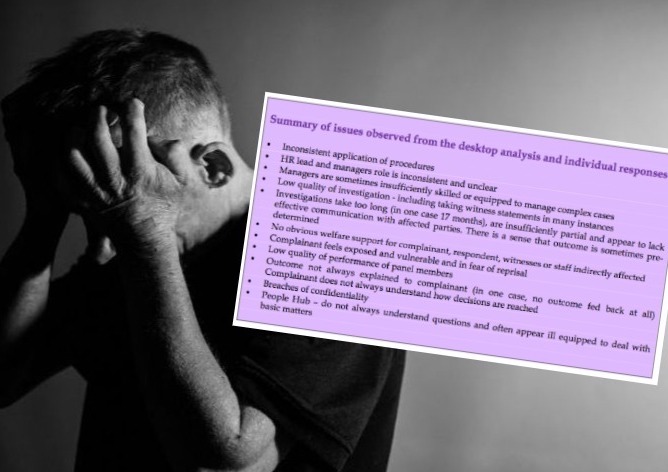


HR specialists who uncovered a “high-level” of secret bullying and harassment in the civil service seven years ago say government has come on "leaps and bounds" – but that it is still struggling with a slew of cynical middle managers, "organisational snobbery", employees worrying their complaints won't be believed and tensions at the top level with politicians.
The report, published by UK company HR Lounge, was a follow-up to two previous assessments which found that Government had problems with bullying, harassment and disciplinary procedures.
Published in 2018, HR Lounge’s original report was intended to remain confidential, but was uncovered by Express following a challenge under the Freedom of Information Law.
It found that public sector employees were being routinely “shouted at”, “belittled” and made the subject of “loose talk and gossip” – few of whom ever spoke out over fears that doing so would be “career wrecking”.

Pictured: Key issues identified in the original report.
When concerns were raised, managers were generally unhelpful, and matters could sometimes take up to a year-and-a-half to resolve.
The findings led the States Employment Board to commit to a number of policy changes, including the establishment of new guidelines on what constitutes bullying and a dedicated whistleblowing line. In the months following the report’s publication, the government also signed a £3.5m contract with a UK consultancy to help change the culture of the organisation and instil a ‘Team Jersey’ attitude in all employees.
The following year, patronising and teasing co-workers was officially designated a form of bullying.
Made public this week, the latest follow-up report noted that "the mood is markedly better, even though there will be those who disagree". They praised Government's "stronger level of openness", with one employee saying their "bosses have come on in leaps and bounds and seem to listen more attentively". However, several areas of improvement were still highlighted.
In the run-up to the vote of no confidence in Kristina Moore's government last year, several allegations were made about politicians exhibiting aggressive or bullying behaviour towards senior civil servants. It was even claimed by one Deputy that former CEO Suzanne Wylie had been left "traumatised from her experience with our Council of Ministers".
Senior officers and politicians both mentioned to HR Lounge that the review should look at conflicts between the highest-ranking officials, as such relationships "might easily deteriorate – in certain circumstances – into one of disagreement and strife".
Due to the level of seniority, the subject matter of fallouts, and these happening in public, HR Lounge found it was "difficult to draft any process that might better safeguard the relationship or be the basis of rebuild if it fell off the rails".
Some interviewees even found the idea of remedial action "plain daft to contemplate".
Others suggested a "confidential mediation type" process should be examined, which HR Lounge said may be a benefit.
While it said that it would not be an appropriate route for all such fall-outs, it would be a useful "backstop" – "after all, the impact of the alternative can be expensive and have far-reaching implications not just for the parties involved and their families but also for the organisation and your residents".
The report looked at government HR's implementation of "values and behaviours" after its last report, finding that though the programme had created improvements, some departments thought themselves as "separate".
They said: "We also detected cynicism at middle management levels and needed to work with this level of management to grab their hearts and minds.
"We thought you should be firmer on breaches of your Values and highlight instances when these were breached.
"We believed that one or two departments – either by way of diffidence or organisational snobbery – regarded themselves as separate."
After the 2018 review, the Government accepted most of the recommendations from HR Lounge, but didn't agree to release periodic bulletins on lessons learned, review how staff promotions occur, create a witness support programme, or implement a "create a friend" system for complainants.
Some managers didn't have a good understanding of what can constitute bullying and harassment, according to the report, which also found that managers had been told to have meetings on the topic but that these hadn't materialised.
"We are not saying that it was majorly misunderstood, but we did pick up some vibes that to be accepted as a complaint of bullying, there had to be some physical or continuous effect of it."
This is not the case legally, they added.
Banter and micro-aggressions came up "a surprising number of times" as a factor that feeds into bullying, they wrote, encouraging managers to "point out and restate your position on the subject".
Employees who make a complaint reported that when they approached HR, they weren't believed.
HR Lounge added that complaints should be investigated from "a point of belief".
One person told them: "I was chastised by the HR person for raising it with my manager rather than approaching the person directly, which I thought was not helpful."
Another person said: "My supervisor told me off for making the complaint formal."
Though it pointed to 16 areas that government HR should "consider in order to make progress", the report's authors didn't make any official recommendations, arguing that these would "not feel to be helpful".
Overall, the report noted that the quality of systems and processes had helped to overcome "workplace cultural issues", though some of these were unique to working in a small island jurisdiction.
Responding to the report, the Vice Chair of the States Employment Board, Deputy Malcolm Ferey, said: "We welcome these findings, which are testament to the hard work of the team within People Services."
"We take bullying and harassment very seriously, and we are clear that they have no place in Jersey's public workforce," he continued.
He said Government would "carefully consider" the findings.
Which is the 'least pleasant' Gov department to work in? (January 2024)
Why can't we know what Government staff really think? (2023)
FOCUS: Measuring the mood in Government (2021)
FOCUS: The sickness in the Health Department (2021)
FOCUS: Five politicians, 7,000 employees and a £420m wage bill (2021)
Does the government still have a bullying problem? (2020)
INSIGHT: Express reveals the States' secret bullying shame (2018)
Comments
Comments on this story express the views of the commentator only, not Bailiwick Publishing. We are unable to guarantee the accuracy of any of those comments.